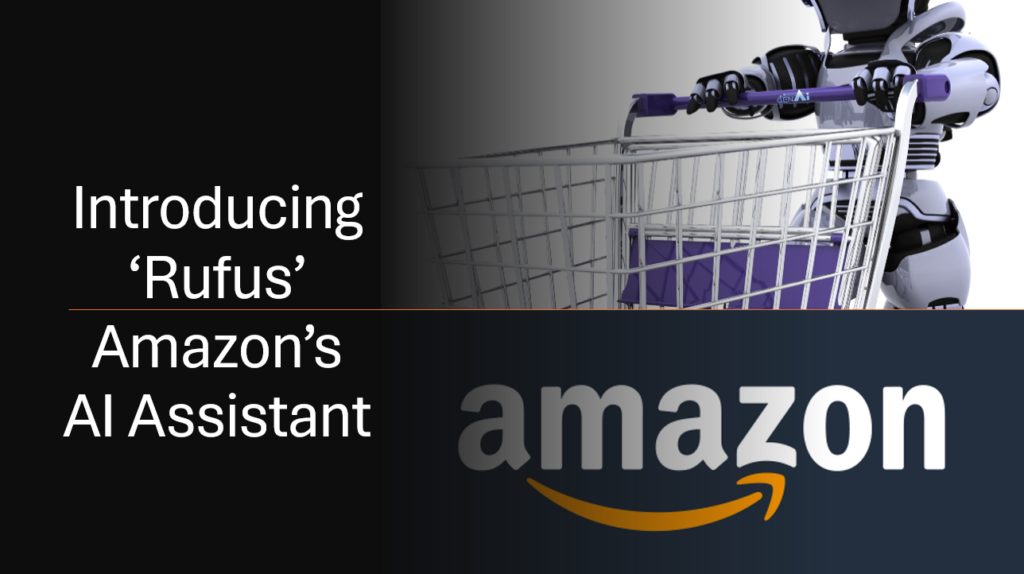Introducing Rufus: Amazon’s Revolutionary AI Shopping Assistant

Amazon, renowned for its relentless pursuit of technological innovation in e-commerce, has unveiled Rufus, an AI-powered shopping assistant set to transform the online shopping experience. Named after the esteemed Corgi dog mascot of the company, Rufus represents a significant leap forward in personalised customer assistance, leveraging cutting-edge artificial intelligence technology to offer expert guidance and facilitate seamless shopping on the platform.
Rufus operates seamlessly within the Amazon ecosystem, uniquely integrated into the main Amazon mobile app. Users can, at ease, engage with Rufus by initiating conversations through the search bar, where the chatbot employs natural language processing to understand user queries and provide relevant responses. Drawing on Amazon’s vast repository of products, reviews, and customer interactions, Rufus delivers tailored recommendations and assistance across a myriad of shopping scenarios.
As Amazon CEO Andy Jassy articulated:
“Rufus lets customers discover items in a very different way than they have been able to do on e-commerce websites”. Rufus will allow Amazon shoppers to: Learn what to consider while shopping for certain product categories (e.g. “What should I consider when shopping for headphones?”).”
Rufus offers a myriad of functionalities aimed at enhancing the shopping experience for Amazon users:
- Learning about considerations for specific product categories, so, to reiterate again Andy Jassy’s words “What should I consider when shopping for headphones?”
- Assisting with product category comparisons
- Providing product ideas and recommendations for various occasions, activities, and purposes (e.g., “What can I buy my Wife for Mother’s Day?”)
- Answering questions about specific products while on a product page
- Engaging in conversational follow-ups to queries (e.g., “Will this umbrella withstand strong winds?”)
The introduction of Rufus marks the dawn of a fresh era in product exploration on Amazon, with a chosen few customers currently trailing the beta edition of this AI assistant. As Rufus is progressively introduced, sellers on Amazon stand ready to observe its influence on their businesses and operations.
Implications for Marketplace Sellers: Navigating the Rufus Era

The implications of Rufus for marketplace sellers are significant, presenting both challenges and opportunities. While the chatbot’s recommendations may influence product visibility, sellers must adapt their strategies to align with Rufus’s architecture and requirements for recommendations.
Understanding Rufus’s product search architecture is paramount for sellers seeking to optimise their listings and enhance discoverability. This entails revising and optimising product listings to accommodate Rufus’s natural language queries and conversational search queries.
In addition, sellers must prioritise localisation efforts to ensure listings are fully optimised in all local languages, catering to diverse customer demographics. Localisation extends beyond translation and search optimisation, encompassing customer support to align with Rufus’s algorithm trained on customer reviews.
Investing in strategic paid advertising efforts is also crucial for sellers navigating the introduction of Rufus. While the chatbot’s recommendations are purportedly not influenced by advertising, strategic ad campaigns can mitigate the impact of fluctuating visibility and ranking drops, ensuring optimal results amid evolving marketplace dynamics.
Rufus: Shaping the Future of E-commerce
In preparing for the larger introduction and rollout of Rufus AI, sellers must leverage their understanding of customer search behaviour and embrace AI-driven tools to navigate the dynamic e-commerce landscape effectively. By staying abreast of the latest developments and applying data-driven strategies, sellers can fine-tune their businesses for success in the era of AI-driven shopping assistance.
For consumers, Rufus embodies a notable advancement in their retail experience. With its tailored suggestions and knowledgeable support, Rufus enables individuals to make well-informed buying choices, thereby conserving both time and energy. As more consumers gravitate toward digital marketplaces for their shopping requirements, the convenience and effectiveness delivered by AI-powered aides such as Rufus are on track to become essential.
For Amazon, Rufus presents a strategic opportunity to further solidify its position as the leading online retailer. By leveraging AI technology to enhance the customer experience, Amazon can strengthen customer loyalty, drive sales, and differentiate itself from competitors. With Rufus serving as a cornerstone of its e-commerce strategy, Amazon is well-positioned to capitalise on the growing demand for tailored shopping assistance.
However, the introduction of Rufus also raises important considerations for marketplace sellers. While the chatbot’s recommendations may increase product visibility and drive sales for some sellers, others may face challenges in adapting to the changing landscape. As Rufus influences the way consumers discover and interact with products, sellers must refine their strategies to ensure their listings remain competitive and relevant.
In conclusion, Rufus represents a significant milestone in the evolution of e-commerce, offering consumers personalised shopping assistance and enhancing the overall shopping experience on Amazon. While the introduction of Rufus may present challenges for sellers, it also opens up new possibilities for innovation and growth. By embracing AI-driven solutions and adapting their strategies to meet the changing demands of the marketplace, sellers can thrive in the era of Rufus and beyond.
As the adoption of AI-driven solutions like Rufus becomes more widespread, it’s essential to delve deeper into the potential impact on various stakeholders within the e-commerce ecosystem. By harnessing the power of AI to deliver individualised recommendations and expert assistance, Amazon and its ecosystem of sellers and consumers are poised to redefine the future of online shopping.


















